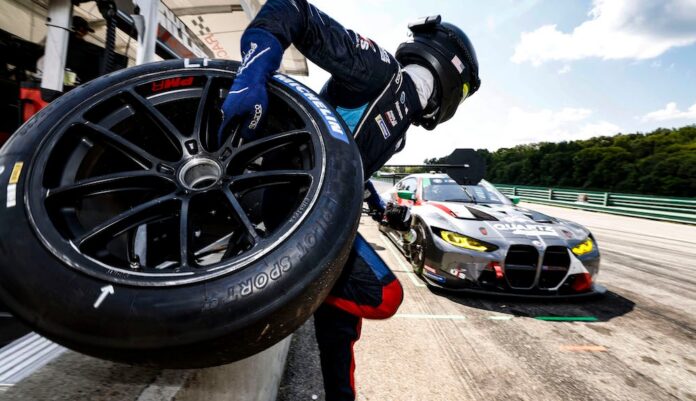In the quest for a genuinely sustainable future, among those pushing hardest are companies in the automotive sector, accelerating development of everything from sustainable fuels and lubricants to battery and fuel cell technology.
When it comes to tires, Michelin has firmly laid down a marker, committing to 100 percent sustainability across the entire company by 2050. Integral to its mission are the enormous strides being made by Michelin Motorsport.
Already proven in the heat of competition are the tires Michelin produces for the FIM Moto E all-electric motorcycle championship, which contain 40 percent sustainable materials on average, both rear and front.
Michelin also works closely with Porsche on the all-electric Porsche 718 Cayman GT4 ePerformance racing program, as well as the hydrogen prototype H24, which anticipates the new hydrogen class at the 24 Hours of Le Mans, both running on tires that contain 53 percent sustainable materials.

The Porsche 718 Cayman GT4 ePerformance sets a standard with tires containing 53 percent sustainable materials.
Michelin sustainable technology is already a part of the IMSA WeatherTech SportsCar Championship, and in 2023 the new breed of hybrid GTP prototypes will race on slick tires containing nearly 30 percent sustainable materials and nearly 45 percent sustainable materials in the wet weather tire.
But when companies like Michelin talk about sustainability, what do they actually mean?
“In our vision, the growth of Michelin Group is based on the right balance between social commitment (people), protection of the environment (planet) and good financial decisions (profit). People, profit and planet are the key elements of Michelin’s ‘All Sustainable’ strategy,” says Mathieu Bonardel, Director of Motorsport for Michelin worldwide. “More specifically to motorsports, Michelin also believes ‘Sustainable Motorsport’ requires this balance.
“We work for the people when we produce a good show. We measure costs and marketing benefits to ensure a good return on investment (profit), and for the planet, our racing activities enhance sustainable innovation to be transferred to Michelin road tires.
“Michelin’s ‘environment focused’ innovation aims at reducing the global footprint of tires through their life cycle,” he adds. “It starts with design, the choice of raw materials and energies, logistics and transportation, the energy loss, wear and CO2 emissions during the use and, at the end, the recycling process. We measure the global impact not only looking at greenhouse gases, but also reviewing 15 other indicators such as water consumption, biodiversity and other relevant criteria for the ecosystem we live in.”
The first Michelin street tires with more than 40 percent sustainable materials will be put on the market for passenger cars and buses within the next three years – and motorsport played a vital role in the development process.
“Motorsport provides fast and beneficial test results on new technologies,” explains Bonardel. “First, we do not need to produce test tires, so we do not consume raw materials and energies in development. Second, we benefit from the best drivers, engineers and equipment in a very demanding environment. One single race is enough to collect valuable feedback within a limited mileage.”

The all-electric FIM Moto E World Cup has provided Michelin a test platform for producing sustainable tires at a higher volume.
Jason Anzalone, Director of Michelin North America’s Motorsport team, is responsible for all racing activities and implementing Michelin’s sustainability strategy in the U.S., which extends to behind the scenes challenges like logistics efficiencies and even using solar power for the service area at the most recent Petit Le Mans. What will be front and center in IMSA this season is an increased emphasis on reducing consumption.
“Our intent with the GTP cars is to bring tires that can double-stint where we can use fewer tires, while still performing at a level that we all want to see on track,” he says.
The message from Michelin is clear: sustainability is not a passing fad, but a path forward to a cleaner environmental future, and the whole company is working to get there as fast as it can at every level.
FORMULA E: EIGHT YEARS OF INNOVATION
Michelin is bidding au revoir to the all-electric FIA Formula E World Championship, but the innovations its participation nurtured and accelerated will endure for decades to come.
From the start of FE in 2014, Michelin’s Pilot Sport EV race tire featured a patterned tread, just like a street tire. That came from a clear technological vision to push the envelope in terms of versatility and longevity. Eight years later, through three generations of development, that similarity to a street tire has enabled Michelin to test and develop innovations on the track and carry them over to its road-going ranges in record time.
Among the achievements, the latest Pilot Sport EV tire boasts 16 percent less rolling resistance, while weight is reduced to the extent that four current tires weigh the same as three Generation 1 tires.
“After 100 Formula E races, Michelin has developed a wide know-how in tires for electric cars,” says Mathieu Bonardel. “In 2021, we introduced the Michelin Pilot Sport EV tire for high-performance electric cars, which are very demanding because of battery weight and strong torque.”
Lessons learned from Michelin’s FE journey in terms of wet and dry grip, durability, and reduced rolling resistance to extend battery range have resolved challenges on both sides of the street/racing divide with lasting benefits.
• To find out more about Michelin’s sustainability initiatives CLICK HERE, and for the latest Michelin Motorsport news, CLICK HERE.




